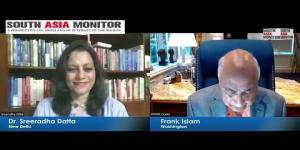Rekindling the spirit of communal amity in Sri Lanka: A Prime Minister's quest
In this newly revived spirit of amity, PM Gunawardena travelled from Jaffna to Kilinochchi by road. There were no protests and he was received at both venues with warmth and cordiality.

For several decades, the two main communities in Sri Lanka – Tamil and Sinhala - fought for their freedom, workers’ rights and equal opportunities as citizens of a single nation since the time the country lost its independence in 1815. However, that strong bond snapped during the three decades of conflict from the 1980s to 2009.
After the ruthless crushing of the 1818 and 1848 rebellions by the British rulers, educated Sinhala and Tamil leaders commenced a movement to demand a share of power peacefully. In the second half of the 18th century, the Colonial Office agreed to set up a Legislative Council comprising ten official members and six unofficial members to appease the local people. However, the strategy was to give representation to the British planters as they demanded a power share, and not to the vast majority of the native population.
Recalling Sinhala-Tamil bonhomie
The protest against this injustice of appointing only British planters as unofficial representatives in the Legislative Council was headed by Sir Ponnambalam Arunachalam, a much respected Tamil leader. In 1911 another Tamil leader, Sir Ponnambalam Ramanathan, whose leadership was unhesitatingly acknowledged by the Sinhala leaders of that time, contested the legislative council election as a candidate for the Educated Ceylonese seat and was elected to the Legislative Council, defeating eminent Sinhala physician Marcus Fernando. Rananathan was supported by Sinhala leaders D S Senanayake (who later became the first prime minister), E W Jayewardene (uncle of President J R Jayewardene) and many others who rightly believed Ramanathan was better suited than Fernando.
Recalling that Sinhala-Tamil bonhomie, former Northern Chief Minister C V Vigneswaran and now MP, described it recently as, “It was the best of times as there was cordial relationship between the two communities”.
Last week when Prime Minister Dinesh Gunawardena visited the Northern capital city of Jaffna, all the Tamil leaders hailing from the North held a cordial discussion with him on the ways and means of solving the problems of the province and for the speedy development of school and university education to provide employment opportunities to local youths. The discussions focused on rekindling the spirit of harmony that had dissipated due to the accumulated mistrust between the communities.
Jaffna District Development Coordination meeting, chaired by Premier Gunawardena, was attended by Vigneswaran, Abraham A Sumanthiran (parliamentary spokesman of Tamil National Alliance), Dharmalingam Siddharthan (former militant who heads People’s Liberation Organization of Tamileelam), Angajan Ramanathan (first SLFP member to get elected from north after four decades) and Minister Douglas Devananda (former military commander of EPRLF who now heads EPDP). Their discussions with the Prime Minister rekindled the hope of reviving the spirit of bonhomie that existed in their fathers’ generation.
Premier Gunawardena, who donated a consignment of valuable books to the Jaffa Library, stressed the need to enhance educational facilities to Northern schools. The visit was an occasion to recall the longstanding camaraderie that existed between the two communities during the era in which leftists took the forefront in the struggle to win the rights for the people, including workers’ rights.
Fight for workers’ rights
It was Jaffna leftist leaders and their committed cadres who defied the colonial rulers and helped the socialist leaders N M Perera, Philip Gunawardena (father of the PM), Colvin R de Silva and others who escaped from prison to take shelter in the North and crossed over to India where they worked for the Indian freedom struggle.
The leaders who fought for workers’ rights include A E Gunasinghe, N Shanmuganathan, Edmond Samarakkody, Robers and Philip Gunwardena, Bala Thampo. The Government Service Clerical Services Union was headed by Alva Pillai who was later succeeded by T B Illangarathne, who later became a minister in the S W R D Bnadaranaike government together with Philip Gunawardena and William Silva.
Prime Minister Gunawardena recalled that Minister Devanandan’s father was also a trade union activist who fought to win rights of the workers. Similar positive sentiments were expressed by all the leaders in their common quest for communal amity in the country.In this newly revived spirit of amity, PM Gunawardena travelled from Jaffna to Kilinochchi by road. There were no protests and he was received at both venues with warmth and cordiality.
All the Tamil parliamentarians and the minister assured the prime minister of unstinted support to speedily implement the development programmes, thus opening up new hope to keep the spirit of commonality alive.
(The author, a former Sri Lankan diplomat, is a political and strategic affairs commentator. Views are personal. He can be contacted at sugeeswara@gmail.com)
amount work? I've virtually no understanding of programming however I was
hoping to start my own blog in the near future. Anyhow, if you have any suggestions
or techniques for new blog owners please share. I understand this is off topic but I just wanted to ask.
Thanks!
descarguen los vídeos.
If you know of any please share. Kudos!
die on the epidermis. For inside makes use of it may help digestion and stop stomach, intestine issues
from occurring.




















Post a Comment